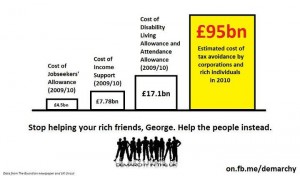In today’s Guardian Miliband Senior writes:
 ‘Imagine political parties focused between elections on mobilising their resources at local level to help people tackle the issues that matter to them. This is where the labour movement started. When Movement for Change helps people come together to get a new security door on their estate, get the living wage paid on their university campus or get bouncers in night clubs to help tackle violence against women, it isn’t only a catalyst for change in society, it also builds the relationships that are key to politics. And if all this sounds a bit Big Society, so much the better – we should never have allowed the Tories to grab the mantle of community investment and leadership.’
‘Imagine political parties focused between elections on mobilising their resources at local level to help people tackle the issues that matter to them. This is where the labour movement started. When Movement for Change helps people come together to get a new security door on their estate, get the living wage paid on their university campus or get bouncers in night clubs to help tackle violence against women, it isn’t only a catalyst for change in society, it also builds the relationships that are key to politics. And if all this sounds a bit Big Society, so much the better – we should never have allowed the Tories to grab the mantle of community investment and leadership.’
“We” should never have allowed the Tories to grab the mantle of community investment and leadership, he says.
There is just so much that is wrong with this statement that it is difficult to know where to begin unpacking it.
The Tories have not grabbed ‘the mantle of community investment and leadership’

The ‘Big Society’ has been conclusively exposed for what it is – a rhetorical device for selling the implementation cuts and austerity on behalf of the 1% to the man on the Clapham Omnibus while, at the same time, seeking to appear compassionate by calling for communities to ‘pull together’ in the spirit of the Blitz and by appearing to champion a ‘localism‘ agenda.
Voluntary charitable organisations, whom the Tories tried to persuade us would fill the void vacated by the State, have had their incomes severely cut to the point whereby they can no longer function. Perhaps the plan always was for compulsory labour schemes such as workfare to take on this role?
It has become apparent to all but the most obtuse, or ideologically brainwashed, that the entire concept of the ‘Big Society’ was a sham from the start designed to deflect blame from the government for its abdication of responsibility to our communities and the most vulnerable in society in cutting essential public services. It provided a propaganda smokescreen and a philosophical justification for pushing through a policy with no redeeming qualities whatsoever.
Looked at from this perspective, we can see that the ‘localism’ narrative fits in well with both Miliband D and Miliband E’s agenda for the future – paying down the deficit and ‘cuts and austerity-lite’.
Millions of people are facing extremely serious, existential issues and this is the best he can come up with? Quite frankly, it is insulting and activists should have absolutely no truck with it.
It is absolute tosh.
‘And if this sounds a bit Big Society so much the better’?
How?
 You might call the MFC “The Hamas Model” of community engagement, because presumably, as our economy and society disintegrates under crushing pain of neoliberal austerity, we’ll all be so very grateful to the ‘Movement for Change’ (‘MFC’ – Sounds like a football club, doesn’t it? And ‘Change’? What, for the sake of it?) squads assistance in getting those security cameras up that we’ll all mobilise en masse, come election time, and sweep Miliband & Co. back into the heady heights of high office.
You might call the MFC “The Hamas Model” of community engagement, because presumably, as our economy and society disintegrates under crushing pain of neoliberal austerity, we’ll all be so very grateful to the ‘Movement for Change’ (‘MFC’ – Sounds like a football club, doesn’t it? And ‘Change’? What, for the sake of it?) squads assistance in getting those security cameras up that we’ll all mobilise en masse, come election time, and sweep Miliband & Co. back into the heady heights of high office.
A cunning plan?
What an arrogant, fantastical and hare-brained suggestion this really is.
They’re going to organise the ‘grassroots’ to be the instruments of their own oppression.
Listening to this complete twonk, you’d think that none of us in civil society were actually doing anything to join together in solidarity to defend ourselves and our communities from the right-wing neoliberal onslaught we are currently facing, when in fact we are rising up, fast!
His MFC agenda sees people as a means to an end – his end – rather than as an end in themselves.
His statement that ‘we should never have allowed the Tories to grab the mantle of community investment and leadership‘ betrays this fact. It’s a hijacker’s charter that has nothing whatsoever to do with authentic community activism and engagement and everything to do with cynical electioneering.
And anyway, Change for what, exactly? Not the privatised capitalist monetary system which got us here, anyway. The ‘shadow economy’ it has spawned based on electronic money, created out of thin air and based on debt bears no relation to real value or the real economy – where things are made and exchanged – it is based on financial speculation, futures and options and other complex financial instruments an derivatives.
It is this shadow, speculative economy that is killing ‘The 99%’.
George Soros, the man who ‘broke the Bank of England’ and who grew up during the Holocaust said recently that “the world faces one of the most dangerous periods of modern history—a period of “evil” .
If Soros is correct, we’ve all really had it with twonks like David. He hasn’t got a clue what the real issues are or how to solve this systemic crisis of capitalism.
He’s not an original thinker, much less leader. He’s a managerial technocrat insulated and cushioned from the realities of suffering and injustice all around us. He needs to look again for the root causes of the crisis. He offers only sticking plaster to a gaping, haemorrhaging wound in need of urgent surgical attention.
Monetary reform is key to resolving this systemic crisis of capitalism. It’s the elephant in the room but all our political class seem either unwilling or too thick to confront it head on. Until they do so “things can only get worse”, to paraphrase the popular tune.
Real Politics in our communities today
Today, as I write, our doctors are on strike because they have been dealt with so treacherously by this government of crooks and thieves.
Andrew Lansley, a politician bankrolled, bought and paid for by a private healthcare industry keen to get a slice of our NHS through commissioning, has got the temerity to suggest that our doctors do not have our best interests at heart – whereas he presumably does – as evidenced by his demand that they work next Saturday to make up the appointments backlog caused by their day of action!
How galling this must be for GPs and Hospital Doctors, who work up to a hundred hours a week having spent many years on far less than the hourly minimum wage while doing their training!
“Work longer, pay more, receive less” about sums up the ConDem approach to pensions.

March for the Alternative, London, 26th March 2011
What unites the struggles of every worker and unemployed worker from every occupational group and trade union is this: The fundamental injustice of making ordinary citizens pay for a debt crisis caused by the Banks and Casino-Capitalists in The City – who are profiting from this crisis as never before in history.
It is to be cuts, austerity, and privatisation of our social wealth and public services for all of us who work in – or rely on them – and a bonanza for ‘The 1%’ whom the Westminster political élites of all parties serve.
Miliband Snr writes that ‘the intellectual heavy-lifting’ needs to be ‘pro-reform – because the chronic challenges of demography and competition cannot be escaped’ adding that this is ‘why Ed’s responsible capitalism agenda is the right one’.
Challenges and competition? No change from Blair’s claptrap at the 2005 party conference there, then.
Ed boasts in the second article published below that both the Archbishop of Canterbury and Bob Diamond endorse his agenda. Bob Diamond?
Is this some sort of twisted joke?
Ed says that:
 ‘The failure of the government’s austerity plan means that the next Labour government is likely to inherit a deficit that still needs to be reduced,” he said. “So even then resources will have to be focused significantly on paying down that deficit’
‘The failure of the government’s austerity plan means that the next Labour government is likely to inherit a deficit that still needs to be reduced,” he said. “So even then resources will have to be focused significantly on paying down that deficit’
‘Resources will have to be focused significantly on paying down that deficit’?
Whose resources? We know you’ve already stated that it would be ‘irresponsible’ to commit to reversing the barbaric cuts to disabled people’s welfare.
These resources, they wouldn’t be those that pay for our education, social care and social security, would they? Surely not from ‘Labour’?

Eddie says it's 'irresponsible' to commit to reversing barbaric cuts to disabled people's welfare
The £120bn tax gap, then?
No, You guessed it. The former.
So what does Mili D’s article amount to?
I’ll let the Tribune Magazine’s Editorial of January 27th earlier this year speak for me:
“Another interpretation – one which is shared among grass roots Labour and trade union members – is that in the democracy vacuum that exists in the party’s policy-making process the Blairite zombies have risen again, in the spirit of the bloody fratricidal wars of the early 1980s, for a fight to the death.”
It’s bananas. And remember – it’s only ‘factionalism’ when the left fights back and the neoliberal clique doesn’t get its own way!
_____________________________________________________________________________
The following comments were selected from readers’ comments on the David Miliband article published by The Guardian and reproduced below:
 Fainche 19 June 2012 7:56PM
Fainche 19 June 2012 7:56PM Blusoulman 19 June 2012 8:01PM
Blusoulman 19 June 2012 8:01PM‘Politics must change – don’t let reform be a victim of the economic crisis’
By David Miliband, The Guardian,

David Miliband: 'The intellectual heavy lifting needs to be anti-austerity, but it also needs to be pro-reform. This is why Ed Mililband’s responsible capitalism agenda is the right one.' Photograph: Rui Vieira/PA
“Our constituents are disengaged and disaffected. For the health of our democracy, we must rejoin their world at a local level.”
The two economic crises of the 20th century were the parents of dramatic changes in the political centre of gravity in western economies.
The 1930s spawned welfare capitalism – a new social contract in which full employment paid for public services and welfare benefits.
The 1970s gave birth to the cocktail of monetarism, privatisation and deregulation that dominated the 1980s.
The 2008 global financial crisis has changed economic debate in western economies in fundamental ways. Keynesianism is back (outside Germany and Britain). Industrial policy is back. The IMF is back. The intellectual heavy lifting needs to be anti-austerity – because the acute financial sector and state sovereignty crises cannot be resolved without growth. But it also needs to be pro-reform – because the chronic challenges of demography and competition cannot be escaped. This is why Ed’s responsible capitalism agenda is the right one.
But the big idea from this crisis needs to be not just economic but also political. Representative democracy is not working. There is gridlock in the US. Deadlock in the eurozone. And in Britain, the latest British Social Attitudes Survey reports that in the past 25 years the percentage of people saying that politicians put the national interest before party interest has fallen from 47% to 20%. The percentage who say it is not worth voting has risen sixfold (to 20%). The recent Hansard Society report documented not just disengagement but also disaffection, not just misunderstanding but also mistrust, not just confusion but also contempt.
The world in which our constituents live is marked by pluralism, flexibility, empowerment, risk-taking, new forms of co-operation, above all trial and error. For a range of reasons, good and bad, that is not our world. Parliament, policy-making and the party system have – the monarchy aside – changed less than any other part of national life in the last 40 years. And that is a problem.
Ministerial reshuffles corrode the relationship with the public and key stakeholders. The civil service is top-down in a bottom-up world. The legislative process is byzantine and ineffective. The progress that is made locally is too often despite national engagement not because of it.
The AV referendum was a botch which reflected these vices. Half-baked because it addressed only one part of parliament, in isolation, it is a case study for how not to reform our politics. I can see House of Lords reform going the same way. The inertia is just too strong. And there is always the argument that “the people don’t care”.
But as soon as politics addresses issues that people are living with every day, it strikes a chord. Just look at the respect and interest generated by the adult and honest debate last week in the House of Commons on mental health. What a contrast to the debate about long-term care – left in the too difficult box for 20 years. Or airports policy that has been left in limbo. Or the shouting match on Europe.
So my plea is that we do not allow political reform – in fact political reformation – to fall victim to the economic crisis. I would make no claim that a single reform is the answer, still less that I have found all the answers. But there is clearly a problem; and there are clues to the answers if we are willing to seek them out.
Imagine political parties focused between elections on mobilising their resources at local level to help people tackle the issues that matter to them. This is where the labour movement started. When Movement for Change helps people come together to get a new security door on their estate, get the living wage paid on their university campus or get bouncers in night clubs to help tackle violence against women, it isn’t only a catalyst for change in society, it also builds the relationships that are key to politics. And if all this sounds a bit Big Society, so much the better – we should never have allowed the Tories to grab the mantle of community investment and leadership.
Imagine that we didn’t just preach subsidiarity in the distribution of power in Europe, but actually practised it at home. We cannot allow the defeat of the mayoral leadership model in referendums around the country to become the death knell for the devolution of power to cities. Politics and political power is seen as remote in Britain … because a lot of it is.
I am passionately engaged in the debate about youth unemployment. We all know that there are different needs in different parts of the country. So we need to devolve power so the right combination of carrots and sticks, welfare and education, childcare and transport, mentoring and job guarantees is available in different parts of the country. As the IPPR points out in a pamphlet published later this week, it cannot be right that the biggest drivers of housing policy are decisions by the DWP about housing benefit, whose cost will rise to £24bn at the end of this parliament. Surely it is worth offering our cities the chance to design housing policy for themselves, with their share of national funds in their hands to decide the balance between subsidising rent and subsidising new build. Ditto in transport.
Imagine that parliament is ahead of debates not behind them, talking about the political, economic and social issues that people are talking about. Every day ministers come to parliament to answer questions – but three-quarters of the topics are submitted in advance. Make every question a “topical” and therefore unseen question, and people might tune in to more than PMQs.
The health of our democracy is not just a matter for politicians. Imagine if the exam question for the new director general of the BBC was not about the admittedly poor coverage of the jubilee river pageant, but instead about how to renew democratic dialogue. They might start with the fact that not a single local government leader other than the mayor of London has ever been on Question Time.
The economic crisis has made politics more volatile. Eleven European leaders have been turfed out of office since the crash. So in 2015 Labour can win the general election in Britain and Ed can be in Downing Street. But the leadership is right to warn against trying to default into power. Reassuring ourselves that all is well and that if we hold tight to old verities the electorate will realise the error of their ways is the most dangerous plan of all. It is politics, not just policy, that we need to change.
• This is a shortened version of a lecture David Miliband is giving as part the Speaker’s Lecture series. Full text will be available at www.davidmiliband.net
 Ed Miliband has expanded on his Labour conference call for an end to predatory capitalism, saying he wanted to re-instill a business ethic that empowered long-term shareholders who were committed to a firm.
Ed Miliband has expanded on his Labour conference call for an end to predatory capitalism, saying he wanted to re-instill a business ethic that empowered long-term shareholders who were committed to a firm.
The Labour leader called for long-term shareholders to have greater voting rights in takeovers, backed workers on company remuneration committees and said he wanted to break up unwarranted private sector monopolies in banking, energy and the media.
Calling for a new responsible capitalism, he said his target was predatory behaviour that was bad for the country and for business.
He added that he was convinced, from his conversations with entrepreneurs, that his ideas were not anti-business but “bang on pro-business” and also said Thursday’s dismal growth forecasts, increased borrowing and mass unemployment showed the UK was at an economic turning point.
“We cannot carry on like this, with austerity at home, collective austerity abroad,” he said. “It is no solution to the problems of jobs, growth or the deficit.”
In his most important speech since his address to the Labour conference six weeks ago, Miliband cited the former CBI director general Richard Lambert in support of his case for a new, more patient, form of capitalism.
He claimed his argument had also been embraced by the archbishop of Canterbury and Bob Diamond, the chief executive of Barclays.
In practice, much of his analysis is shared by the team around the business secretary, Vince Cable.
Cable has established two reviews – one on executive pay and another on corporate long-termism being undertaken by Professor John Kay – the findings of which are to be published shortly.
Miliband set out five areas for reform. First, he called for a new relationship between finance and the real economy, based on banks lending to business and not seeing success simply measured by short-term profits made and taxes paid.
“Businesses deserve a finance system there for the long haul when it comes to creating value in the real economy,” he said.
He said he was also looking at proposals for a UK Investment Bank and at the US experience of the programmes run by the country’s small business administration which have helped firms such as Apple, FedEx and Intel succeed.
Second, drawing on the work of Professor Michael Porter*, Miliband said he wanted firms to think about achieving long-term success, requiring institutional investors to become less impatient for quick returns.
He said he had met “business people over and over again who tell me they simply cannot get support for the long-term investments they need”, adding: “We need to look at why so many funds of institutional investors seem to be managed as if the only important issue was the next quarterly announcement.
“We need to look at whether the voting rights of shareholders should always be the same from day one of ownership. We need to look at how the tax system can encourage and discourage short-term behaviour that holds Britain back.”
Miliband said he wanted to consider giving shareholders with long-term holdings greater power, particularly at times of takeovers.
The idea was floated by Lord Mandelson at the time of Cadbury Kraft takeover in 2010. Boards of companies being targeted by takeover offers often face conflicting pressures, torn between their obligation to maximise value for shareholders and a desire to deliver long-term growth plans that may ultimately generate better value.
The Companies Act requires public company boards take into account the impact of a potential takeover on stakeholders other than shareholders, but this ranks below the fiduciary duty to shareholders.
Miliband said he wanted to look at the value of continuing with the quarterly company report, asking whether it put pressure on patient capitalism.
In the third of his five steps for reform, he called for a better system of encouraging vocational skills, meeting unmet market need. He said a system was needed where the “benefits of training are shared between the firm, the worker and society”.
Fourth, he called for restraints on executive pay, saying: “Just as in our welfare state, we need to ensure a greater relationship between contribution and reward, so too at the top.”*
He called for an employee on the remuneration committee of every major company to restore trust and transparency on pay.
Finally, he urged an end to “large concentrations of unaccountable private power that lead to higher prices, exploit consumers and lead to inefficiency”.
He also said the scale of the financial crisis facing government meant the old Blair-Brown approach, with social progress resting on higher investment, was over.
“The failure of the government’s austerity plan means that the next Labour government is likely to inherit a deficit that still needs to be reduced,” he said. “So even then resources will have to be focused significantly on paying down that deficit.”
http://www.guardian.co.uk/politics/2011/nov/17/miliband-cameron-change-course-economy

 penpoints
penpoints
3 Responses
David Milliband…….neo-liberal fool with no idea of what he stands for or what party he should be in, on those grounds he should be ignored. Ed needs to get to grips with reality, his party at grassroots level will revolt against him if he continues to play the sop to the Blairite legacy within the Labour party. Socialism is the only answer to this appalling situation, the reason society is crumbling is because of the 1% who suffer from an OCD condition of desperation as regards to money, simply they can never have enough of it, and if you have it , then they will take it from you.South Korea dealt with its bank fraud the correct way, we have not, and the lies being spun by this government are simply to create a nation that is the next state of America. We do not want to be anything like that appalling nation which commits as many human rights breaches as the other nations it loves to point the finger at. The way it is going no political party will have an answer to the current situation. Perhaps we need a new one, maybe a real party of the people, with the people and for the people, that is the only way real change will occur. Right now we have been lied to and deceived by politicians of all hues, it is time to ignore their spin and charlatanism, for we are at the risk of becoming UK INC, a division of every single disgusting corporation just waiting to get its fingers into the deliberate wreck of once was our proud public services. Maybe we need bigger change than anyone anticipates, but one thing is certain, we do not need politics and politicians, media that do everything but tell the truth, and a 1% who do not give a toss about the other 99%, this is a certainty.
Bloody well put, David!
our ed hasnot worked out yet weather to leave blair back in to the party so no change there , still cant see benefits cuts affecting the disabled and sick unemployed starving them to death ,no change there then. ALL these private companys working to our supreme goverment talking our money which would pay for us thus no need to have them BUT they take it our money whilst we starve ,no change there then , AND to cap it all off our labour partys not even going to rid us of these yanky robbing firms who even in their own countrys couldnot survive as they all got chucked out of the usa,but has he made his mind up no we work with them ,SO no change ther then,WILL he ever get round to winning next election there may be no change there as he,s not even listening to those who would vote for him, so no change there , and there we have it folks no change we got a very long dark road to walk the only good thing is we aint alone jeff3